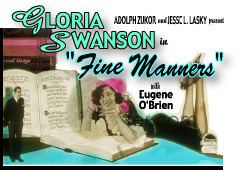

Famous Players-Lasky
Distributed by Paramount Pictures
Premiered August 16, 1926
Seven reels, 69 minutes
Directed by Richard Rosson
CAST: Gloria Swanson (Orchid Murphy), Eugene O'Brien (Brian Alden), Helen Dunbar (Aunt Agatha), Walter Goss (Buddy Murphy), John Miltern (Courtney Adams)
Gloria Swanson once said, "I was 25 and the most popular
celebrity in the world, with the possible exception of my friend
Mary Pickford." (1) This would likely have been true around
1924 when she would have been 25 years old (of course, one must
admit that she conveniently overlooked Chaplin). However, looking
back from our vantage point today, it may be a little difficult
to rank Swanson above stars such as Chaney, Gish, Lloyd, Keaton,
Fairbanks, and others. Certainly the aforementioned names have
struck a chord in the hearts of 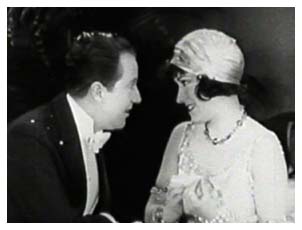 today's
silent movie fans much more than Swanson. But, why is that?
today's
silent movie fans much more than Swanson. But, why is that?
First of all, Swanson's career is not as well represented on the home video market as it should be. We can see her in a couple of Sennett comedies such as "The Danger Girl" (1916) and "Teddy at the Throttle" (1917). In the restored DVD category, we have some of the DeMilles - "The Affairs of Anatol" (1919), "Don't Change Your Husband" (1919) and "Male and Female" (1919). Then there is "Queen Kelly" (1929), the von Stroheim-directed misfire, and also what may be the best of the high-quality DVD releases, "Sadie Thompson" (1928), but it is incomplete, missing the final reel. The much-anticipated recent discovery of "Beyond the Rocks" (1922) with Rudolph Valentino was simply - well, let's just say it was less than the anticipation promised. Secondly, although the 1950 "Sunset Boulevard" was an acting tour-de-force for this film legend and garnered her an Academy Award nomination, it may have been, in the final analysis, an unfortunate milestone in her career as legions of movie-lovers now believe that Swanson was, in essence, giving an autobiographical performance. In later years, Swanson vehemently denied this. "A lot of people thought Norma Desmond was the story of my life," she told author John Kobal. "I'm not a recluse, nor am I out of the past. In fact, it's awfully hard for me to even talk about." Kevin Brownlow related an amusing story about a maid at the CarltonTower Hotel in London who asked Swanson, "The story of 'Sunset Boulevard' - how much of it was your story?" Affecting a Norma Desmond drawl, Swanson responded, "All of it, dear. I really am the greatest star of them all. But I hide away from people. I live in the past. And if you take a quick look in the bathroom, you'll find a body floating face downward right now." (2) Apparently she had a good sense of humor, too!
What seems to be either undiscovered or a least not given
the credit they are due are the light-hearted, fun, comedic and
romantic "romps" that she made such as "Manhandled"
(1925), "Bluebeard's Eighth Wife" (1923 - unfortunately
lost), "Stage Struck" (1925) and the film being considered
here "Fine Manners" (1926). Swanson's filmography includes
only a handful of these films, most of her work being drama -
but as a viewing of these films will prove, Swanson handled the
comedy with style and skill making for some fun and 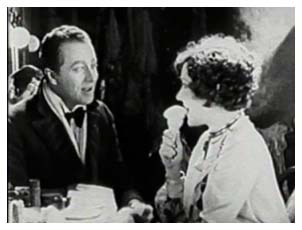 entertaining
picturizations.
entertaining
picturizations.
In "Fine Manners," Swanson is a spunky, Irish burlesque dancer who meets the wealthy Brian Alden (O'Brien) on New Year's Eve when Alden gets bored with his stuffy friends at a very stiff New Year's Eve gathering and decides to go into downtown New York. As expected, it is a melee of revelry, bodies pressed shoulder to shoulder with streamers and confetti constantly whirling through the air. The crowd presses her against Alden's chauffeur-driven limousine, and when she sees the top hat and formal attire, she decides to tease him. First she points one of the traditional "blowouts" at him which unfurls in his face, then taunts, "Come out from under the High Hat! Maybe you're alive and don't know it!" Alden is charmed, and the encounter leads to the two sitting in a busy café and enjoying each other's company - that is, until her brother comes along.
Buddy (Goss) is a "street-tough" who feels the need to protect his sister, and Orchid knows he'd never approve of her associating with someone from "uptown." Thinking quickly, Orchid tells Alden to pose as the waiter - appropriate for his attire at the moment. Later, when she tells Buddy she and Alden are going out, Buddy is perfectly fine with his sister dating a waiter. The late dinner seals their mutual appeal, and a romance begins.
The two begin to see each other regularly, and, after attending one of Orchid's performances (she's in the chorus line at the Winter Garden), they go for an evening at Coney Island. In addition to getting a cheap pair of beads from one of the mechanical crane machines (which Orchid cherishes) and watching a fire eater, Orchids chases down and spanks a young boy who steals her purse. Of course, they end up taking him with them when they visit the flea circus. The evening is certainly not typical for Alden, but not only has Orchid thoroughly enjoyed her evening, so has Alden, and he's totally smitten.
Trouble begins to brew in more than one way, though. Buddy finds out Alden's true identity and threatens Orchid, "Go out with him again, an' it'll be the last time he goes out with any girl!" However, later, when Alden proposes to her, Orchid feels sure this will make everything alright with Buddy. Unfortunately, Buddy is not yet convinced that Alden will follow through with the marriage.
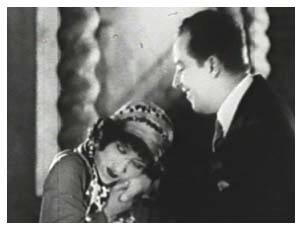 The relationship is challenged
once again when Alden asks her to come live with his Aunt while
he's in South America for six months - promising, upon his return,
they will be married. However, there's a catch! During that
time, he wants his Aunt to teach Orchid about "our way of
living." When Alden tells her of his plan, she is hurt.
"Oh . . . then there's something wrong with me now? Don't
you like me as I am?" But, Alden convinces her that it's
all for the best when they are married, and, because of her love
for him, she agrees.
The relationship is challenged
once again when Alden asks her to come live with his Aunt while
he's in South America for six months - promising, upon his return,
they will be married. However, there's a catch! During that
time, he wants his Aunt to teach Orchid about "our way of
living." When Alden tells her of his plan, she is hurt.
"Oh . . . then there's something wrong with me now? Don't
you like me as I am?" But, Alden convinces her that it's
all for the best when they are married, and, because of her love
for him, she agrees.
"Fine Manners" is a engaging and enjoyable comedy-drama with a perfect balance between those two elements. Swanson's charm and exuberance consummately suit Orchid Murphy's character; however, Swanson was also a fine dramatic actress, and the tense scenes with Buddy are superbly portrayed with fear and anxiousness being conveyed eloquently by Swanson. When Alden proposes but adds that his Aunt will be teaching her about "our way of living," the hurt on her face is real. Throughout the film, director Richard Rosson wisely implements a generous serving of close-ups of Swanson which enhances these scenes and treats us to Swanson's expressive eyes and exquisite beauty.
One appeal of the story is that the love Orchid and Alden have for each other is genuine and deep. We would have been disappointed had the love affair ended because of the "different world" theme. It is much more to our liking that they overcome the differences in their background - but, in the end, without either having to change for the other. We fully expected Orchid to decline the marriage proposal and walk away angry when Alden suggests she receive instruction about living in "his world." However, although, hurt, she agrees. So is the "spunk" we admired in Orchid Murphy going to be drained from her? Certainly not! She cooperates fully with Aunt Agatha, but, what she learns is actually used later to teach Alden a lesson! Buddy is another challenge, however, and shows up with a gun on the very night when Orchid and Alden are on the verge of resolving the conflict in their relationship!
Apparently "Fine Manners" was a happy experience
for Swanson. She remembered Rosson as capable director. "Richard
Rosson turned out to be a delightful surprise," she said.
"Since he had learned his directing from Allan (Dwan), he
was a superb technician. . . In addition, he was a bright, creative
person. If he wasn't Allan Dwan yet, he was on the way."
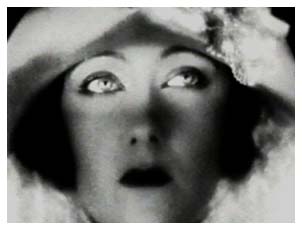 Although she only mentioned that O'Brien
was her leading man, she spoke with fond memories of her old friend
Helen Dunbar who portrayed Aunt Agatha. "She had been there
since the egg cracked open and I emerged. The first day I ever
wept buckets on cue at Essanay in 1915, Helen Dunbar had said
to me, 'You know, young lady, one day you'll be a good actress.'
and I replied, to my everlasting shame, 'Yes, I know. I'm going
to be very famous.' We had worked together several times since,
but we had never again discussed my acting ability or my fame,
and we didn't now. We didn't have to. We were two old pros in
'Fine Manners,' and both pretty good." (3)
Although she only mentioned that O'Brien
was her leading man, she spoke with fond memories of her old friend
Helen Dunbar who portrayed Aunt Agatha. "She had been there
since the egg cracked open and I emerged. The first day I ever
wept buckets on cue at Essanay in 1915, Helen Dunbar had said
to me, 'You know, young lady, one day you'll be a good actress.'
and I replied, to my everlasting shame, 'Yes, I know. I'm going
to be very famous.' We had worked together several times since,
but we had never again discussed my acting ability or my fame,
and we didn't now. We didn't have to. We were two old pros in
'Fine Manners,' and both pretty good." (3)
Harrison's Reports said, "Very good! It is, in fact, a better picture than any of those which Miss Swanson has made since 'Wages of Virtue.' The story holds the interest well; Miss Swanson does a very good piece of acting; the spectator is made to laugh in many situations . . . The picture has been produced well all around." (4)
According to Variety, "Whoever is responsible for picking the story deserves credit, for it fits the star like a glove, is right in her wheelhouse, and allows her an opportunity for pathos and comedy that shows her at her best. . . One of her best!" (5)
Not surprisingly, Mordaunt Hall in The New York Times took an opposing viewpoint. "There are one or two scenes in which the photography is quite clever, but the narrative, as a whole, is not especially absorbing, which at times may be a virtue, as it gives you the opportunity of thinking of other things that must be done during the day or the next." (6)
The DVD reviewed here is from Grapevine Video and runs 69 minutes. By all appearances, the print is complete, although Harrison's Reports also lists it at 6,435, but notes the running time between 74 and 91 minutes. The film speed of Grapevine's release appears to be very natural and appropriate. Grapevine provides a fine-looking menu with thumbnails for chapter selection. The print is contrasty - better in some parts than others - but very watchable and essentially free from scratches, mottling or other demons that haunt many of our silent movie prints. It includes a very enjoyable organ score by David Knudtson who continues to do an excellent job on many of Grapevine's DVD's. Grapevine's release of "Fine Manners" is good fun, a pleasure to watch, and a welcome addition to the home video market that should please any silent movie fan. It is highly recommended.
References
1. Kobal, John. People Will Talk. Alfred A. Knopf,
1986.
2. Brownlow, Kevin. The Parade's Gone By (Bonanza Books,
1968.
3. Swanson, Gloria. Swanson on Swanson: An Autobiography. Random
House. 1980.
4. "Fine Manners" review. Harrison's Reports.
August 14, 1926.
5. "Fine Manners" review. Variety. September
8, 1926.
6. "Fine Manners" review. The New York Times.
August 30, 1926.
Copyright 2013 by Tim Lussier. All rights reserved